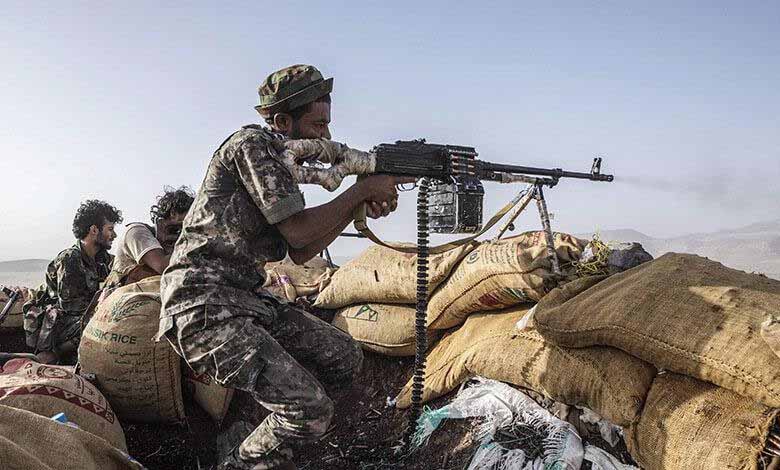Targeting Oil Installations… Houthi Terrorism Threatens World Security

The Houthi bombing of Yemen’s oil facilities threatens global energy security, and calls for urgent steps to deter coup militias.
Yemeni activists and officials urged the Presidential Command Council and the Arab coalition to take deterrent steps against Houthi militias in response to their attack on the Dabba oil port.
The Houthi attack on the vital port in Hadhramout province on Friday provoked unprecedented reactions and was seen as a blow to peace, direct terrorism against global energy sources and the expansion of the war from the military to the economic sphere.
The attack by Houthi militias was the last nail in the coffin of peace, coming more than two weeks after the UN truce ended on 2 October and tantamount to a declaration of war as the most serious attack ever in six months.
The end of Houthi, the beginning of peace
Activists and officials from the Presidential Council and the Arab coalition supporting it called for action to activate the mechanisms of deterrence and force and to save the Yemeni people, in accordance with the law, from the aggression of the Houthi terrorist militias supported by Iran.
“The Houthi militias’ continued control of Sanaa is a permanent threat to security and stability in Yemen and the region, as well as to international peace and security of international navigation,” said Abdul Malik al-Mekhlafi, deputy chairman of the Consultation and Reconciliation Commission, the highest body under the Presidential Council.
In a tweet, the senior Yemeni official said that the end of Houthi militias is “the beginning of peace and stability, and the international community must realize that peace is not the Houthi choice, and that Iranian militias are a permanent threat to peace, human life, and stability in Yemen and the region.”
According to Abdel Malik, Salem Thabet Al-Awlaki, a member of the Transitional Council’s Presidency Council, said that Houthi militias rely “on a strategy of gradual conquest of regions, playing with the time factor,” and on an “exception” strategy to achieve political and economic gains. After a few months, the “exception” becomes a “entitlement.”
The Yemeni leader said that the Houthi militias are trying to delegitimize their sovereign decisions in their favor because of the concessions they received in the Stockholm Agreement and other concessions for the truce. He pointed out that Houthi “turned it into field, political and economic gains and did not abide by the implementation of one of his commitments.”
Al-Awlaki wrote on his Facebook page that “Today, the Houthi militias are working to gain new concessions under the banner of ‘achieving peace’. Whoever believes this is delusional and is surrendering his neck, land and future to Houthi.”
He stressed that “soft rhetoric and concessions will not prove a truce and will not achieve peace, but rather enable Houthi, and we must stop this course, because Houthi understands nothing but the language of force, as happened in Bayhan directorates.” He urged the Presidential Command Council “to work on directing new defeats at Houthi, because it is more effective than offering concessions.
Presidential options
“The Presidential Council has many options for responding to Houthi militias at all levels – politically, economically, militarily, security, and even socially – by triggering internal uprisings in areas under its control.”
According to experts, the options include exposing Houthi senior and field commanders in charge of the so-called “missile force and the march” and Iranian experts informally, imposing sanctions on them domestically, and pressing for regional and international punishment.
Mervat Abdul-Waseh, a Yemeni economic researcher, said that it is important to deal seriously with the attacks of Houthi militias through various options, including military deterrence as well as raising the issue to international forums, given that it concerns Yemen and the world in general, as it is a threat to global energy sources.
The Houthi attacks “contribute to aborting the internationally recognized government’s efforts to operate sovereign and vital installations,” she said. “Everyone knows that a secure environment is necessary in a country like Yemen to contribute to economic development in general, and this of course will be beneficial to the world and neighboring countries.”
Yemeni activist Fares al-Hassam said Houthi militias “have continued to target vital facilities and civilian in flagrant violations that amount to full-scale war crimes”. He said the Dabba oil attack undermines peace efforts and increases the chances of calm.
“Today, political and military accounts must be rearranged as required by the current situation and developments, and we must do what is necessary to meet the terrorist risks that have increased at a high rate and to cut off Iran’s terrorist arms, which are represented by the Houthi militias,” he said on his Twitter account.
He also urged the Yemeni government to activate the “Counter-Deterrence Force” to protect the land and international interests and to restore the Houthi militias to their natural size and location.
“The Houthi militias have taken advantage of the international community’s inaction in escalating their terrorist threats against oil installations and international interests to brazenly and brazenly target the Dabba oil port in Hadramaut with two car bombs,” said Lt. Col. Mohammed al-Naqib, spokesman for the southern forces in Yemen.
According to the military official, “These terrorist attacks will not enable the Houthi militias to impose their conditions, and our forces still reserve the right of retaliation and deterrence.”
“The revenues of the wealth of southern Yemen will not be allowed to the same Houthi terrorist militias to finance their war and terrorism, which targets our country and the region in general, international interests and global energy supplies,” he said.












